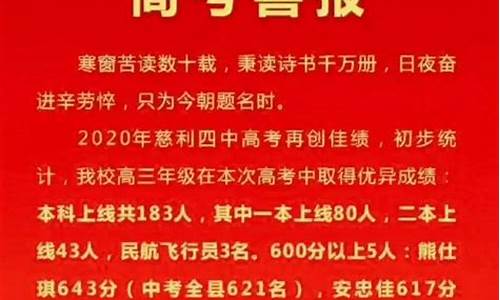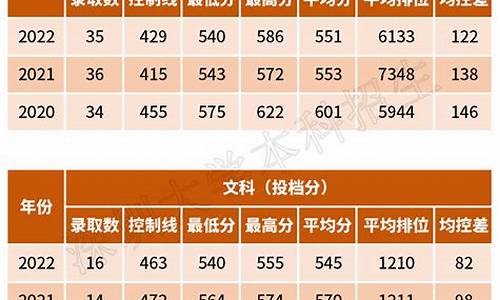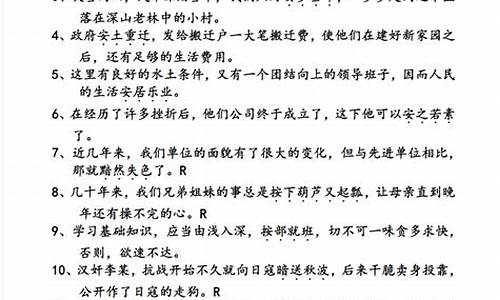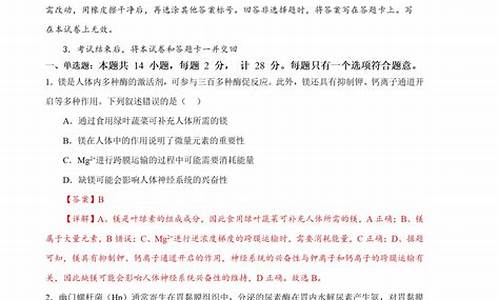17北京高考英语,2017英语高考北京卷
1.北京高考科目安排时间表
2.今年高考英语考试可“迟到”?
3.高考英语从几点考到几点
4.北京高考时间
5.河北英语高考题2017年
6.有关高考的英语口语句子合集
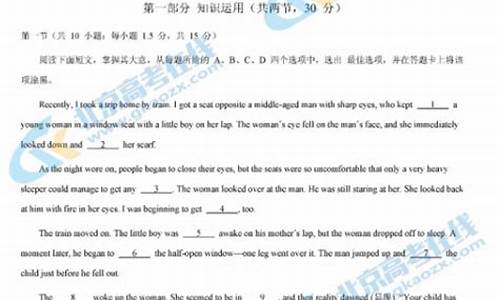
高中文理综合合集百度网盘下载
链接:s://pan.baidu/s/1znmI8mJTas01m1m03zCRfQ
?pwd=1234提取码:1234
简介:高中文理综合优质资料下载,包括:试题试卷、课件、教材、、各大名师网校合集。
北京高考科目安排时间表
北京高考一共考4天。
北京统一高考科目时间为6月7日至8日。学考等级考科目由考生自主选择3门参加考试,考试时间为6月9日至10日。
北京2023年考试时间安排:
6月7日:上午9:00至11:30考语文,下午15:00至17:00考数学。
6月8日:15:00至16:30考英语(笔试),15:00至17:00考其他外语(含听力考试)外语考试分英语、俄语、日语、德语、法语、西班牙语六个语种,由考生任选一种。
6月9日:8:00至9:30考物理,11:00至12:30考思想政治,下午15:30至17:00考化学。
6月10日:上午8:00至9:30考历史,11:00至12:30考生物,下午15:30至17:00考地理。
高考模式:
1、3+文科综合、理科综合
高考“3+文科综合、理科综合”模式,各考6个学科,4种试卷,即报考文科的学生考:语文、数学、英语和文科综合,报考理工科的学生考:语文、数学、英语和理科综合。语文、数学和英语等三个学科各150分,共450分。文科综合和理科综合均为300分。高考总分是750分。
2、新高考3+1+2
用新高考“3+1+2”模式的是“七省一市”,分别是广东、福建、湖南、湖北、河北、辽宁、江苏和重庆。高考考试科目,包括语文、数学和英语三门必考,其他三门高考科目,分为两个类别。
3、新高考3+3
用新高考“3+3”模式的省、市,主要有北京、上海、天津、浙江、山东、海南。高考模式是语文、数学、英语等三个学科各150分。其他选考科目,从物理、化学、生物、思想政治、历史、地理等六个学科中任意选择三个学科作为高考科目,各100分。
以上数据出自高三网。
今年高考英语考试可“迟到”?
北京高考科目安排时间表为6月7日:语文,数学;6月8日:英语;6月9日:物理,政治,化学;6月10日:;历史,生物,地理。
详细安排:6月7日09:00-11:30语文;6月7日15:00-17:00数学;6月8日15:00-16:30英语(笔试);6月8日15:00-17:00其他外语(含听力考试);6月9日08:00-09:30物理;6月9日11:00-12:30思想政治;6月9日15:30-17:00化学;6月10日08:00-09:30历史;6月10日11:00-12:30生物;6月10日15:30-17:00地理。
北京市普通高等学校招生考试包括统一高考和普通高中学业水平等级性考试。统一高考科目为语文、数学、外语3门。学考等级考科目为思想政治、历史、地理、物理、化学、生物6门,由考生自主选择3门参加考试。外语考试分英语、俄语、日语、德语、法语、西班牙语六个语种,由考生任选一种。
高考:
普通高等学校招生全国统一考试,简称“高考”,是合格的高中毕业生或具有同等学力的考生参加的选拔性考试。普通高等学校招生全国统一考试,是为普通高等学校招生设置的全国性统一考试,每年6月7日-10日实施。参加考试的对象是全日制普通高中毕业生和具有同等学历的中华人民共和国公民,招生分理工农医(含体育)、文史(含外语和艺术)两大类。
普通高等学校根据考生成绩,按照招生章程和,德智体美劳全面衡量,择优录取。普通高等学校招生全国统一考试由国家主管部门授权的单位或实行自主命题的省级教育考试院命制;由教育部统一调度,各省级招生考试委员会负责执行和管理。教育部要求各省(区、市)考试科目名称与全国统考科目名称相同的必须与全国统考时间安排一致。
2015年起,高考逐步取消体育特长生、奥赛等6项加分项目 。2019年,教育部严禁宣传“高考状元”、“高考升学率”,加强对中学高考标语的管理,坚决杜绝任何关于高考的炒作。2021年2月19日,教育部发出《教育部关于做好2021年普通高校招生工作的通知》。明确,2021年全国统考于6月7日举行。
高考英语从几点考到几点
2018年高考将于6月7日、8日举行。从北京教育考试院获悉,今年各科目开考15分钟后,考生不得进入考点参加当科目考试。值得一提的是,由于高考英语听力考试已经提前完成,此次英语考试只考笔试,因此考生在开考后15分钟内仍可入场。
北京教育考试院高招办有关负责人介绍,文史类考生考试科目为语文、数学(文)、外语、文科综合;理工类考生考试科目为语文、数学(理)、外语、理科综合。语文、数学(文/理)、外语满分均为150分,文科综合/理科综合满分为300分,高考满分750分。
据了解,从2018年高考起,普通高考外语听力实行一年两考。其中,英语科目第一次听力和第二次听力机考已分别于2017年12月16日和2018年3月17日顺利完成;其他外语语种科目(小语种)第一次听力考试于2018年1月8日进行,第二次考试将于6月8日进行。因此,6月8日举行的英语科目考试只考笔试,而小语种科目则全卷考试。
同时,今年外语科目考试入场时间也做了相应调整:考前25分钟考生入场,开考15分钟后不得进入考点参加外语考试。而往年英语科目的考试由于要考听力和笔试,开考前15分钟即不得入考场。
此外,语文科考前30分钟、其他科考前25分钟,考生可持和准考证进入考场。各科目开考15分钟后,考生不得进入考点参加当科目考试。交卷出场时间不得早于每科目考试结束前30分钟,交卷出场后不得再次进场续考。
考生进入考场时,除2B铅笔、黑色字迹签字笔(建议用0.5mm黑色字迹签字笔)、直尺、圆规、三角板、无封套橡皮、标准化考试模板外,其他任何物品不得带入考场。考生进入考场后,按准考证对号入座,将和准考证放在桌子右上角以便核验。考生领到答题卡后,按要求在规定时间内在指定位置准确、清楚地填写姓名、准考证号,并在监考员指导下正确粘贴个人信息条形码。
开考信号发出后,考生方可答题。考生要用现行规范的语言文字答题。试题答案要全部答在答题卡上,在试题册或草稿纸上答题无效。考生要按答题卡上注意事项所列要求作答。要在答题卡上与题号相对应的答题区域内作答,不得在答题卡上规定答题区域外作答,也不得在答题卡上任何地方做任何标记。
考生在考场内要保持安静,不得交头接耳、左顾右盼、打手势、做暗号,不得夹带、旁窥、抄袭或有意让他人抄袭,不得传抄答案或交换试题册、答题卡、草稿纸。考试结束信号发出后,考生要立即停笔,待监考人员收齐检查无误发出指令后,方可依次离开考场。
如不遵守考场规则,不服从考试工作人员管理,有违规行为的,将按照《中华人民共和国教育法》《国家教育考试违规处理办法》等有关法规处理,并记入国家教育考试诚信档案。涉嫌违法的,移送司法机关,依照《中华人民共和国刑法》等追究法律责任。
北京高考时间
高考英语是下午15:00-17:00。
一、2023年新高考改革英语
1,2023年新高考改革中英语科目将继续保留,不过具体的考试形式和内容可能会有所调整。据了解,新高考英语科目的考试形式可能会更加注重综合能力的考察,加强对学生英语实际应用能力的测试,而非仅仅强调语言知识的掌握。
2,同时,英语科目的考试内容也可能会更加贴近实际生活和工作,注重学生的英语交际能力和跨文化交际能力的培养。总体来说,新高考改革英语科目的目标是培养具有综合素质和全球视野的英语人才,所以学生在备考时需要注重语言实践的能力和跨文化交际的能力的提升。
3,最为重要的是,高考改革后,英语一年可以考两次。根据安排,一次是在6月,和高考中的语文、数学等科目同时进行,还有一次,则在10月份,可以和选考科目同时进行。最终,系统会选择考试分数最高的一次英语考试,计入到高考总分数中。
4,英语学科应强调语言的实际应用,回归学科的正确位置,突出基础知识、基本能力和课程标准的基本要求,降低英语学科在高考招生中的权重。
二、2023年高考英语怎么算分
(一)在不同的地区对于高考英语听力的计算方式并不一样,因此就导致各地高考关于英语成绩的计算方式不一样,以下将分别介绍相关情况:
1,通过计算计入高考成绩
(1)根据广东省2023年发布的高考政策可知,外语选考英语语种:英语科目总成绩:笔试成绩×13÷12+英语听说考试成绩(四舍五入取整),英语听说考试成绩:英语听说考试卷面分÷3(四舍五入取整)。
(2)注:英语科目满分150分,同样根据相关政策可知,其中提到:夏季高考英语科目笔试分值为130分,英语听说考试分值为20分(卷面分满分60分)。
2,取较高的一次成绩计入
部分省份会取两次听力考试的办法,如山东、北京、天津等,在这份地区中就是取两次考试中成绩较高的一次计入高考成绩,然后再加上高考中的笔试成绩就构成高考英语的满分。
3,听力不计入总分
还有一部分地区虽然高考英语试卷中有听力部分,但是听力并不会计入高考成绩,只是会在投档时提供给招生院校作为录取时的参考,然后将剩余部分按照同比例放大,就是高考英语的成绩,如河南省、湖南省、甘肃省等
4,直接计入总分
还有一部分地区则是直接将高考英语试卷中的英语听力成绩计入总分,卷面是多少分就直接以多少分计入高考成绩,如四川省等。
河北英语高考题2017年
此地高考时间为6月7日至6月10日。
根据教育部规定,北京高考时间定于每年的6月7日至6月10日。6月7日至6月10日期间,天气适宜,考生答题和老师阅卷条件较好,有利于考生发挥和阅卷老师批阅。
具体时间安排:7号9:00到11:30考语文,15:00到17:00考数学;8号15:00到16:30考英语,15:00到17:00考其他外语;9号8:00到9:30考物理,11:00到12:30考思想政治,15:30到17:00考化学;10号8:00到9:30考历史,11:00到12:30考生物,15:30到17:00考地理。
有关高考的英语口语句子合集
许多在眼前看来天大的事,都不是人生一战,而只是人生一站。确实高考备战让你们很辛苦,可是已经坚持了这么久,这就已经是胜利。祝高考成功!下面是我为大家推荐的河北英语高考题2017年,仅供大家参考!
河北英语高考题2017年第I卷
注意事项:
1.答第I卷前,考生务必将自己的姓名、准考证号填写在答题卡上
2.选出每小题答案后,用2B铅笔把答题卡上对应题目的答案标号涂黑。如需改动,用橡皮擦干净后,再选涂其他答案标号。不能答在本试卷上,否则无效
第一部分听力(共两节,满分30分)
做题时,先将答案标在试卷上,录音内容结束后,你将有两分钟的时间将试卷上的答案转涂到答题卡上
第一节(共5小题;每小题1.5分,满分7.5分)
听下面5段对话。每段对话后有一个小题,从题中所给的A、B、C三个选项中选出最佳选项,并标在试卷的相应位置。听完每段对话后,你都有10秒钟的时间来回答有关小题和阅读下一小题题。每段对话仅读一遍。
例:How much is the shirt?
A.£19.15. B.£9.18. C.£9.15.
答案是C。
1. Where is Mary?
A. In the classroom. B. In the library. C. On the playground.
2. How much should the man pay for the tickets?
A. $16. B. $12. C. $6
3. Why can?t the woman give the man some help?
A. She is quite busy now.
B. She doesn?t like grammar.
C. She is poor in grammar,too.
4. What hened to Marx?
A. He lost his way.
B. He found his bike missing.
C. He lost his wallet.
5. Why did the man fail to attend the party?
A. He forgot it.
B. He didn?t know about the party.
C. He wasn?t invited to the party.
第二节(共15小题;每小题1.5分,满分22.5分)
听下面5段对话或独白。每段对话或独白后有几个小题,从题中所给的A、B、C三个选项中选出最佳选项,并标在试卷的相应位置。听每段对话或独白前,你将有时间阅读各个小题,每小题5秒钟;听完后,各小题将给出5秒钟的作答时间。每段对话或独白读两遍。
听第6段材料,回答第6、7题。
6. Why must the man drive to work?
A. It is the quickest way.
B. He has to use his car after work.
C. He lives too far from the subway.
7. What?s the relationship between the speakers?
A. Boss and employee.
B. Grandmother and grandson.
C. Teacher and student.
听第7段材料,回答第8~9题。
8. When is Alice?s birthday?
A. Tomorrow. B. The day after tomorrow. C. Today.
9. What will the two speakers buy for Alice?
A. A recorder. B. Some flowers. C. A box of chocolates.
听第8段材料,回答第10~12题。
10. What does the woman do in the group?
A. Play the piano. B. Play the violin. C. Sing for the group.
11. Who is Miss Pearson?
A. Leader of the group.B. Director of the group. C. Teacher of the group.
12. How often does the group meet?
A. Once a week. B. Twice a week. C. Every third week.
听第9段材料,回答第13~16题。
13. Who possibly is the woman?
A. An air hostess. B. A native Indian. C. A trel agent.
14. How long does the trip last?
A. Seven days. B. Eight days. C. Nine days.
15. What will the man probably do at the second stage?
A. Do some shopping. B. Visit the Taj Mabal. C. See wild animals.
16. What will the speakers do next?
A. Say goodbye to each other.B. Find out the price. C. Go to India by air.
听第10段材料,回答第17~20题。
17. In what way does Jack like to trel?
A. With a lot of people.
B. With one or two good friends.
C. All by himself.
18. What does Helen prefer on holiday?
A. Staying at home.
B. Seeing famous places.
C. Enjoying nature quietly.
19. What does Bob like the best about trel?
A. Making more friends. B. Buying what he wants. C. Seeing and learning.
20. Who prefers to do shopping while treling?
A. Jack. B. Helen. C. Bob.
第二部分阅读理解(共两节,满分40分)
第一节(共15小题;每小题2分,满分30分)
阅读下列短文,从每题所给的四个选项(A、B、C和D)中,选出最佳选项,并在答题卡上将该项涂黑。
A
We he designed all our bank cards to make your life easier.
Using your NatWest Service Card
As a Switch card, it lets you pay for all sorts of goods and services, whenever you see the Switch logo. The money comes straight out of your account, so you can spend as much as you like as long as you he enough money (or an agreed overdraft (透支) to cover it). It is also a cheque guarantee card for up to the amount shown on the card. And it gives you free access to your money from over 31,000 cash machines across the UK.
Using your NatWest Cash Card
You can use your Cash Card as a Solo card to pay for goods and services wherever you see the Solo logo. It can also give you access to your account and your cash from over 31,000 cash machines nationwide. You can spend or withdraw what you he in your account, or as much as your agreed overdraft limit.
Using your cards abroad
You can also use your Service Card and Cash Card when you?re abroad. You can withdraw cash at cash machines and pay for goods and services wherever you see the Cirrus or Maestro logo displayed.
We take a commission charge (手续费) of 2.25% of each cash withdrawal you make (up to£4) and a commission charge of 75 pence every time you use Maestro to pay for goods or services. We also ly a foreign-exchange transaction fee of 2.65%.
Using your NatWest Credit Card
With your credit card you can do the following:
* Pay for goods and services and enjoy up to 56 days? interest-free credit.
* Pay in over 24 million shops worldwide that display the MasterCard or Visa logos.
* Collect one AIR MILE for every£20 of spending that ears on your statement (结算单). (This does not include foreign currency or treler?s cheques bought, interest and other charges.)
21. If you carry the Service Card or the Cash Card, ________.
A. you can use it to guarantee things as you wish
B. you can draw your money from cash machines conveniently
C. you can spend as much money as you like without a limit
D. you he to pay some extra money when you pay for services in the UK
22. If you withdraw£200 from a cash machine abroad, you will be charged ________.
A. £4 B. £4.5 C. £5.25 D. £5.3
23. Which of the following is TRUE about using your NatWest Credit Card?
A. You he to pay back with interest within 56 days.
B. You can use the card in any shop across the world.
C. You will be charged some interest beyond two months.
D. You will gain one air mile if you spend £20 on treller?s cheques.
24. The purpose of the passage is to show you how to ________.
A. pay for goods with your cards B. use your cards abroad
C. draw cash with your cards D. play your cards right
B
Once when I was facing a decision that involved high risk, I went to a friend. He looked at me for a moment, and then wrote a sentence containing the best advice I?ve ever had: Be bold and bre ? and mighty (强大的) forces will come to your aid.
Those words made me see clearly that when I had fallen short in the past, it was seldom because I had tried and failed. It was usually because I had let fear of failure stop me from trying at all. On the other hand, whenever I had plunged into deep water, forced by courage or circumstance, I had always been able to swim until I got my feet on the ground again.
Boldness means a decision to bite off more than you can eat. And there is nothing mysterious about the mighty forces. They are potential powers we possess: energy, skill, sound judgment, creative ideas ? even physical strength greater than most of us realize.
Admittedly, those mighty forces are spiritual ones. But they are more important than physical ones. A college classmate of mine, Tim, was an excellent football player, even though he weighed much less than the erage player. ?In one game I suddenly found myself confronting a huge player, who had nothing but me between him and our goal line,? said Tim. ?I was so frightened that I closed my eyes and desperately threw myself at that guy like a bullet ? and stopped him cold.?
Boldness ? a willingness to extend yourself to the extreme?is not one that can be acquired overnight. But it can be taught to children and developed in adults. Confidence builds up. Surely, there will be setbacks (挫折) and disointments in life; boldness in itself is no guarantee of success. But the person who tries to do something and fails is a lot better off than the person who tries to do nothing and succeeds.
So, always try to live a little bit beyond your abilities?and you?ll find your abilities are greater than you ever dreamed.
25. Why was the author sometimes unable to reach his goal in the past?
A. He faced huge risks. B. He lacked mighty forces.
C. Fear prevented him from trying. D. Failure blocked his way to success.
26. What is the implied meaning of the underlined part?
A. Swallow more than you can digest. B. Act slightly above your abilities.
C. Develop more mysterious powers. D. Learn to make creative decisions.
27. What can be learned from Paragraph 5?
A. Confidence grows more rapidly in adults. B. Trying without success is meaningless.
C. Repeated failure creates a better life. D. Boldness can be gained little by little.
C
The wallet is heading for extinction. As a day-to-day essential, it will die off with the generation who read print newspapers. The kind of shopping-where you hand over notes and count out change in return?now hens only in the most minor of our retail encounters,like buying a bar of chocolate or a pint of milk from a corner shop. At the shops where you spend any real money, that money is increasingly abstracted. And this is more and more true, the higher up the scale you go. At the most cutting-edge retail stores?Victoria Beckham on Dover Street, for instance?you don't go and stand at any kind of cash register when you decide to pay. The staff are equipped with iPads to take your payment while you relax on a sofa.
Which is nothing more or less than excellent service, if you he the money. But across society, the abstraction(抽象) of the idea of cash makes me uneasy. Maybe I'm just old-fashioned. But earning money isn't quick or easy for most of us. Isn't it a bit incredible that spending it should hen in half a blink(眨眼)of an eye? Doesn't a wallet?that time-honoured Friday-night feeling of pleasing, promising fatness?represent something that matters?
But I'll lee the economics to the experts. What bothers me about the death of the wallet is the change it represents in our physical environment. Everything about the look and feel of a wallet?the way the fastenings and materials wear and tear and loosen with age, the plastic and paper and gold and silver, and handwritten phone numbers and printed cinema tickets?is the very opposite of what our world is becoming. The opposite of a wallet is a smartphone or an iPad. The rounded edges, cool glass, smooth and unknowable as pebble(鹅卵石). Instead of digging through pieces of paper and peering into corners, we move our fingers left and right. No more counting out coins. Show your wallet, if you still he one. It may not be here much longer.
28. What is hening to the wallet?
A. It is disearing. B. It is being fattened.
C. It is becoming costly. D. It is changing in style.
29. What makes the author feel uncomfortable nowadays?
A. Sing money is becoming a thing of the past.
B. The pleasing Friday-night feeling is fading.
C. Earning money is getting more difficult.
D. Spending money is so fast and easy.
30. Why does the author choose to write about what's hening to the wallet?
A. It represents a change in the modern world.
B. It has something to do with everybody's life.
C. It marks the end of a time-honoured tradition.
D. It is the concern of contemporary economists.
31. What can we infer from the passage about the author?
A. He is resistant to social changes.
B. He is against technological progress.
C. He feels reluctant to part with the traditional wallet.
D. He feels insecure in the ever-changing modern world.
#英语口语# 导语高考英语其实拿高分很简单,但是需要不断地积累,不断地学会运用,下面是由 无 整理的有关高考英语口语句子合集,一起来了解下吧!
篇一高考英语口语句子
1. That is the reason why I’m not in four of revising the plan.
这就是我不赞成修正这个的原因。
2. His failure was due to the fact that he had not practised for a long time.
他的失败是由于他没有练习很长时间。
3. It is likely that it will rain in the evening.
可能晚上会下雨。
4. How they went to America is what I want to know.
他们如何到的美国是我想知道的事情。
5. It occurred to him that he had left his key at home.
他突然想起把钥匙落在了家里。
6. The reason why he came late was that he didn’t catch the early bus.
他迟到的原因是他没有赶上早班车。
7. I’m looking forward to the day when Tai Wan returns to China.
我期待着台湾回归祖国的那一天。
8. He sat by the fire, reading a novel.
他坐在火旁,读着一本。
9. My dream came true at last.
我的梦想最终实现了。
10. It will not be long before we meet again.
不久之后我们就会再次见面的。
11. The English play in which my students acted at the New Year’s party was a great success.
新年聚会上,学生表演的这部英语剧非常成功。
12. I worked in a business where almost everyone is waiting for a great chance.
我在一家几乎都在等好机会的企业里工作。
13. He kept looking at her, wondering whether he had seen her somewhere.
他一直看着她,想知道他是否在某个地方见过她。
14. It is a great honor for Beijing that the 2008 Olympic Games will be held in Beijing.
2008年奥运会将在北京举行对北京来说是一个很大的荣誉。
15. Timmy was fined a large sum of money by the judge for drunken driving.
由于被判定酒驾,Timmy 被罚了一大笔钱。
16. Although he thought he was helping us with the work, he was actually in the way.
尽管他认为是在帮我们,实际上是在碍事。
17. Most hotels he websites where you can find answers to your questions.
大多数旅馆都有你可以找到你问题答案的网站。
18. That most of languages are now threatened and may disear is a serious matter to the people.
大多数语言受到威胁可能会消失,这对人们来说是件危急的事情。
19. The fact that Great Britain is made up of three countries is still unknown to many people.
很多人仍然不知道英国由三个国家组成。
20. Now that you’ve got a chance, you might as well make full use of it.
既然你有机会,不妨好好利用它。
21. It was only when I reread his poems recently that I begin to reciate their beauty.
在我重读他诗歌的时候,我才开始领会它们的美。
22. As is reported in the newspapers, talks between the two countries are making progress.
正如报纸上所报道的那样,两国之间的谈话正在取得进展。
23. They came to the conclusion that not all things can be done by a computer.
他们得出结论,不是所有的事情都可以被计算机做。
24. Smoking does great harm to our health.
吸烟对我们的健康造成很大的危害。
25. Only then did he realize his mistakes.
仅仅那个时候他才意识到他的错误。
26. Come and see me whenever you are convenient .
方便的时候来看看我。
27. I thought Jim would say something about his school report , but he didn’t mention it .
我想吉姆会说一些关于他成绩单的事情,但是他没有提。
28. By the end of last year , another new gymnasium had been completed in Beijing.
到去年年底为止,另一个体育馆已经在北京被建成了。
29. when and where to go for the on—salary holiday has not been decided.
带薪休的时间和地点还没有被决定。
30. I wonder why Jenny hasn’t written us recently. We should he heard from her by now.
我想知道珍妮最近没给我们写信的原因,目前为止我们本应该收到她的来信的。
篇二高考英语口语练习句子
1.Typical of the grassland dwellers of the continent is the American antelope, or pronghorn. 美洲羚羊,或称叉角羚,是该大陆典型的草原动物。
2. Of the millions who saw Haley’s comet in 1986, how many people will live long enough to see it return in the twenty-first century. 1986年看见哈雷慧星的千百万人当中,有多少人能够长寿到足以目睹它在二十一世纪的回归呢?
3. Anthropologists he discovered that fear, hiness, sadness, and surprise are universally reflected in facial expressions.人类学家们已经发现,恐惧,快乐,悲伤和惊奇都会行之于色,这在全人类是共通的。
4. Because of its irritating effect on humans, the use of phenol as a general antiseptic has been largely discontinued. 由于苯酚对人体带有刺激性作用,它基本上已不再被当作常用的防腐剂了。
5. In group to remain in existence, a profit-making organization must, in the long run, produce something consumers consider useful or desirable.任何盈利组织若要生存,最终都必须生产出消费者可用或需要的产品。
6. The greater the population there is in a locality, the greater the need there is for water, transportation, and disposal of refuse. 一个地方的人口越多,其对水,交通和垃圾处理的需求就会越大。
7. It is more difficult to write simply, directly, and effectively than to employ flowery but vague expressions that only obscure one’s meaning. 简明,直接,有力的写作难于花哨,含混而意义模糊的表达。
8. With modern offices becoming more mechanized, designers are attempting to personalize them with warmer, less severe interiors. 随着现代办公室的日益自动化,设计师们正试图利用较为温暖而不太严肃的内部装饰来使其具有亲切感。
9. The difference between libel and slander is that libel is printed while slander is spoken. 诽谤和流言的区别在于前者是书面的,而后者是口头的。
10. The knee is the joints where the thigh bone meets the large bone of the lower leg. 膝盖是大腿骨和小腿胫的连接处。
11. Acids are chemical compounds that, in water solution, he a sharp taste, a corrosive action on metals, and the ability to turn certain blue vegetable dyes red. 酸是一种化合物,它在溶于水时具有强烈的气味和对金属的腐蚀性,并且能够使某些蓝色植物染料变红。
12. Billie Holiday’s reputation as a great jazz-blues singer rests on her ability to give emotional depth to her songs. Billie Holiday’s作为一个爵士布鲁斯乐杰出歌手的名声建立在能够赋予歌曲感情深度的能力。
13. Essentially, a theory is an abstract, symbolic representation of what is conceived to be reality. 理论在本质上是对认识了的现实的一种抽象和符号化的表达。
14. Long before children are able to speak or understand a language, they communicate through facial expressions and by making noises. 儿童在能说或能听懂语言之前,很久就会通过面部表情和靠发出噪声来与人交流了。
15. Thanks to modern irrigation, crops now grow abundantly in areas where once nothing but cacti and sagebrush could live. 受当代灌溉(技术设施)之赐,农作物在原来只有仙人掌和荞属科植物才能生存的地方旺盛的生长。
16. The development of mechanical timepieces spurred the search for more accurate sundials with which to regulate them. 机械计时器的发展促使人们寻求更精确的日晷,以便校准机械计时器。
17. Anthropology is a science in that anthropologists use a rigorous set of methods and techniques to document observations that can be checked by others. 人类学是一门科学,因为人类学家用一整套强有力的方法和技术来记录观测结果,而这样记录下来的观测结果是供他人核查的。
18. Fungi are important in the process of decay, which returns ingredients to the soil, enhances soil fertility, and decomposes animal debris. 真菌在腐化过程中十分重要,而腐化过程将化学物质回馈于土壤,提高其肥力,并分解动物粪便。
19. When it is struck, a tuning fork produces an almost pure tone, retaining its pitch over a long period of time. 音叉被敲击时,产生几乎纯质的音调,其音量经久不衰。
20. Although pecans are most plentiful in the southeastern part of the United States, they are found as far north as Ohio and Illinois . 虽然美洲山河桃树最集中于美国的东南部但是在北至俄亥俄州及伊利诺州也能看见它们。
篇三高考英语必背句子
1.经济的快速发展 the rapid development of economy
2.人民生活水平的显著提高/ 稳步增长theremarkable improvement/ steady growth of people’sliving standard
3.先进的科学技术 advanced science and technology
4.面临新的机遇和挑战 be faced with new opportunities and challenges
5.人们普遍认为 It is commonly believed/ recognized that…
6.社会发展的必然结果 the inevitable result of social development
7.引起了广泛的公众关注 arouse wide public concern/ draw public attention
8.不可否认 It is undeniable that…/ There is no denying that…
9.热烈的讨论/ 争论 a heated discussion/ debate
10. 有争议性的问题a controversial issue
11.完全不同的观点 a totally different argument
12.一些人 …而另外一些人 … Some people… while others…
13. 就我而言/ 就个人而言 As far as I am concerned, /Personally,
14.就…达到绝对的一致 reach an absolute consensus on…
15.有充分的理由支持 be supported by sound reasons
16.双方的论点 argument on both sides
17.发挥着日益重要的作用 play an increasingly important role in…
18.对…必不可少 be indispensable to …
19.正如谚语所说 As the proverb goes:
20.…也不例外 …be no exception
21.对…产生有利/不利的影响 exertpositive/ negative effects on…
22.利远远大于弊 the advantages far outweigh the disadvantages。
23.导致,引起 lead to/ give rise to/ contribute to/ result in
24.复杂的社会现象 a complicated social phenomenon
25.责任感 / 成就感 sense of responsibility/ sense ofachievement
26. 竞争与合作精神 sense of competition and cooperation
27. 开阔眼界 widen one’s horizon/ broaden one’s vision
28.学习知识和技能 acquire knowledge and skills
29.经济/心理负担 financial burden / psychologicalburden
30.考虑到诸多因素 take many factors into account/ consideration
31. 从另一个角度 from another perspective
32.做出共同努力 make joint efforts
33. 对…有益 be beneficial / conducive to…
34.为社会做贡献 make contributions to the society
35.打下坚实的基础 lay a solid foundation for…
36.综合素质 comprehensive quality
37.无可非议 blameless / beyond reproach
39.致力于/ 投身于 be committed / devoted to…
40. 应当承认 Admittedly,
篇四高考英语作文万能句子
一、开头句子
1.As far as ...is concerned 就……而言
2.It goes without saying that... 不言而喻,...
3.It can be said with certainty that... 可以肯定地说......
4.As the proverb says, 正如谚语所说的,
5.It has to be noticed that... 它必须注意到,...
6.It's generally recognized that... 它普遍认为...
7.It's likely that ... 这可能是因为...
8.It's hardly that... 这是很难的......
9.It's hardly too much to say that... 它几乎没有太多的说...
10.What calls for special attention is that...需要特别注意的是
11.There's no denying the fact that...毫无疑问,无可否认
12.Nothing is more important than the fact that... 没有什么比这更重要的是…
13.what's far more important is that... 更重要的是…
二、衔接句子
1.A case in point is ... 一个典型的例子是...
2.As is often the case...由于通常情况下...
3.As stated in the previous paragraph 如前段所述
4.But the problem is not so simple. Therefore 然而问题并非如此简单,所以……
5.But it's a pity that... 但遗憾的是…
6.For all that...对于这一切...... In spite of the fact that...尽管事实......
7.Further, we hold opinion that... 此外,我们坚持认为,
8.However , the difficulty lies in...然而,困难在于…
9.Similarly, we should pay attention to... 同样,我们要注意...
10.not(that)...but(that)...不是,而是
11.In view of the present station.鉴于目前形势
12.As has been mentioned above...正如上面所提到的…
13.In this respect, we may as well (say) 从这个角度上我们可以说
14.However, we he to look at the other side of the coin, that is... 然而我们还得看到事物的另一方面,即 …
三、结尾句子
1.I will conclude by saying... 最后我要说…
2.Therefore, we he the reason to believe that...因此,我们有理由相信…
3.All things considered,总而言之 It may be safely said that...它可以有把握地说......
4.Therefore, in my opinion, it's more advisable...因此,在我看来,更可取的是…
5.From what has been discussed above, we may safely draw the conclusion that….通过以上讨论,我们可以得出结论…
6.The data/statistics/figures lead us to the conclusion that….通过数据我们得到的结论是,....
7.It can be concluded from the discussion that...从中我们可以得出这样的结论
8.From my point of view, it would be better if...在我看来……也许更好
四、举例句子
1.Let's take...to illustrate this.
2.let's take the above chart as an example to illustrate this.
3. Here is one more example.
4.Take … for example.
5.The same is true of….
6.This offers a typical instance of….
7.We may quote a common example of….
8.Just think of….
五、常用于引言段的句子
1. Some people think that …. 有些人认为…To be frank, I can not agree with their opinion for the reasons below. 坦率地说,我不能同意他们的意见,理由如下。
2. For years, … has been seen as …, but things are quite different now.多年来,……一直被视为……,但今天的情况有很大的不同。
3. I believe the title statement is valid because…. 我认为这个论点是正确的,因为…
4. I cannot entirely agree with the idea that ….我无法完全同意这一观点的… I believe….
5. My argument for this view goes as follows.我对这个问题的看法如下。
6. Along with the development of…, more and more….随着……的发展,越来越多…
7. There is a long-running debate as to whether….有一个长期运行的辩论,是否…
8. It is commonly/generally/widely/ believed /held/accepted/recognized that….它通常是认为…
9. As far as I am concerned, I completely agree with the former/ the latter.就我而言,我完全同意前者/后者。
10. Before giving my opinion, I think it is essential to look at the argument of both sides.在给出我的观点之前,我想有必要看看双方的论据。
六、表示比较和对比的常用句子和表达法
1. A is completely / totally / entirely different from B.
2. A and B are different in some/every way / respect / aspect.
3. A and B differ in….
4. A differs from B in….
5. The difference between A and B is/lies in/exists in….
6. Compared with/In contrast to/Unlike A, B….
7. A…, on the other hand,/in contrast,/while/whereas B….
8. While it is generally believed that A …, I believe B….
9. Despite their similarities, A and B are also different.
10. Both A and B …. However, A…; on the other hand, B….
11. The most striking difference is that A…, while B….
声明:本站所有文章资源内容,如无特殊说明或标注,均为采集网络资源。如若本站内容侵犯了原著者的合法权益,可联系本站删除。




